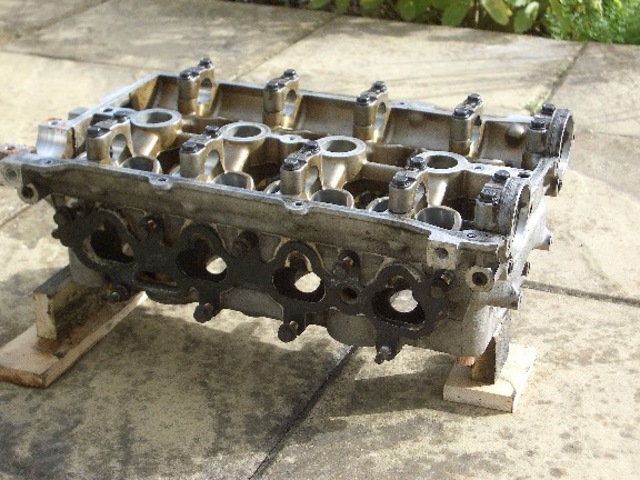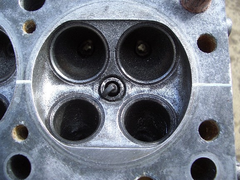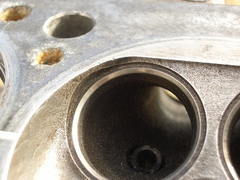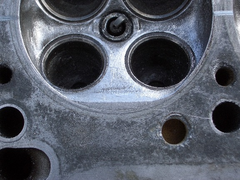This is the standard 1600cc head;


MX5 whole 1600 head
and this is the standard combustion chamber;


1600 MX5 combustion chamber
[Edited on 23/10/06 by JAG]

A little while ago I bought a second MX5 engine so that I could do some tuning but at the same time keep my car on the road as long as possible. So
I've stripped the head off and been having a go at modifying the head to give a few more bhp.
This is the standard 1600cc head;


MX5 whole 1600 head
and this is the standard combustion chamber;


1600 MX5 combustion chamber
[Edited on 23/10/06 by JAG]
So far I've attacked the combustion chambers to remove some of this valve shrouding;


Shrouded valve
This is the exhaust valve side partially complete;


Part modified valve seats
I plan on removing more metal around the valve seats. The seats are recessed into the casting and the step must limit flow at low valve lift. You can
see some of my work on this; there's a chamfer that runs partially around the circumference of the two valves.
Also I've removed the step behind the valves and reduced the squish area a little. I'm hoping this will have more benefit than consequence.
I guess I'll find out when I fit the head.
The real beauty of all this is if it's worse than standard I can re-fit the standard head again.
I'll post some more pictures as the head nears completion. Any one like to comment on the work so far?
Please be gentle with me and remember I'm no expert on this subject 
[Edited on 23/10/06 by JAG]
If you remove metal from the combustion chamber will you reduce the compression slightly? You might consider skimming the head (or fitting a turbo!)
You are correct. It will reduce the compression ratio slightly.
quote:
fitting a turbo!


Is this a 1.8 or a 1.6?
If it's a 1.6 have you looked into the joys of the lightweight sports crank?
It's a 1600cc (edited the first post now - Thanks) but I've never heard of the lightweight sports crank.
I'm not going that far down this modified engine route but would be interested in a link if you have one.
Be careful as you need to make sure you still get some swirl.
Jag,
If you are planning on bumping up the compression significantly, I suggest you focus some attention on removing any sharp edges from within the
chamber, the sharp lips I can see at the "squish" areas may need a little attention, just try and put a little rad on the edge, that should
be sufficient. Any sharp edges in the chamber encourage overheating and detonation, especially at high compression.
Adam
You can tell if you have the LWSC by looking at the crank pulley.
If you look at it there are a number of slots in the outer part of the pulley, count them and pray you have more than 4! If you don't then you
have to be super careful changing the cam belt. If you undo the crank nose when changing the belt you can end up destroying the crank. The crank nose
has a keyway that locks the pulley in place, if you get the torque settings wrong they key usually ends up wearing away the crank nose which allows
timing to swing between 18 degrees btdc and 14 degrees atdc!!!!! (car runs like a dog)
The other thing to be careful of with the 1.6 is the cylinder head changed during the model run. After '94 the UK model was released with a 90odd
bhp 1.6 engine, all of the changes were in the head. I hope your second head isn't from a later UK car as all of your work could be in vain.
Also, you don't have to lower the compression ratio on the 1.6 lump.
It's the same engine as in the 323 turbo, complete with oil squirters on the underside of the piston. The majority of kits for the 1.6 just bolt
on with no internal work. We have one of the gurus from Flyin' miata on here, Keith Tanner. What he doesn't know about them isn't worth
knowing about.
Guys,
Thanks for all the comments.
Lightweight sports crank; I new of this problem but not this name  and I don't have one in either engine.
and I don't have one in either engine.
Both are 1990-1993 so should be 116bhp and the standard compresion ratio is 9.4:1. The amount of material I have removed is tiny so it's probably
about 9.2:1 now so I don't think I've done any harm.
.... and the ultimate plan is a turbocharger. Probably just 6psi to start with and then.......?
I have spoken with Keith about this series of modifications but on the Se7ens list not this forum.
[Edited on 23/10/06 by JAG]
DON'T TURBO IT!!!!!
please don't!!!!
Use a positive displacement supercharger. It will be easier, cheaper and Sooooooooo much nicer to drive, you will be glad you took this advice if you
do!!!
You can use a ebay mini jobbie for very little money and it will be the perfect size for your application.
please don't turbo it!
I agree with Nat, super would be much smoother and easier all round in the long term.
The chambers and ports......They work together, so both need attention. The short side radius on the inlets and exhausts would give more benefit than
the slight loss in CR from losing the step at the valve seats and the chamber shrouding.
Losing the step will allow a better flow at low lift (which the engine spends more time at than max), and smoothing the short side of the ports will
enhance that flow yet again. So, the increased flow will put more air into the chamber than the CR loss needs to compensate, giving an actual working
CR rise.
All in theory, of course. 
Cheers,
Syd. 
Superchargers work well, no doubt. However I prefer the turbocharger for a few reasons;
1) Much lower power consumption for the same boost pressure - the energy used to drive a turbocharger is almost free.
2) Lower charge air temperatures because Centrifugal compressors are more efficient than almost all supercharger compressors.
3) Easier installation in my engine bay. Superchargers are physically bigger (for similar flow) and require a belt drive.
Also the boost/no boost nature of a turbocharger can be pretty much overcome these days by careful set-up, turbo selection and electronic boost
control.
So as you can see I've done my homework, understand the theory and principles involved and I think I've made an informed choice. Feel free
to re-educate me 

I'd agree with CaLviNx about the combustion chambers, but then it depends how much work you wanna do. I had to have the head off my daily driver,
a 1.4 Renault 19, to renew the gasket, so I just had to 'clean' the posrt and chambers didn't I Waisted the inlet valve stems and
re-angled the backs of them to help breathing, had the head skimmed, 'cos I can't see the sense in not with the head off, and decided to
de-shroud the valves a bit whilst I was there as there is a big raised lump in the chamber which I imagine, in my inexperience, is summat to do with
increased squish for emissions control purposes. Anyway, carved lumps out with the die grinder, which gained chamber volume and was (probably)
subsequently lost again when the head was skimmed and kept the CR about the same. BUT, I didn't burette the chamber afterwards and so now the
idle is rough due, I'm guessing, to an imbalance of chamber sizes. If I did/do it again I'll definitely be doing the buretting thing.
Waisted the inlet valve stems and
re-angled the backs of them to help breathing, had the head skimmed, 'cos I can't see the sense in not with the head off, and decided to
de-shroud the valves a bit whilst I was there as there is a big raised lump in the chamber which I imagine, in my inexperience, is summat to do with
increased squish for emissions control purposes. Anyway, carved lumps out with the die grinder, which gained chamber volume and was (probably)
subsequently lost again when the head was skimmed and kept the CR about the same. BUT, I didn't burette the chamber afterwards and so now the
idle is rough due, I'm guessing, to an imbalance of chamber sizes. If I did/do it again I'll definitely be doing the buretting thing.
The results? Well, the 1.4 energy engine is built to be fuel efficient, not performance, so it's only got single point injection and a tortuous
inlet manifold, but it now seems to rev far more happily than it did, thought that might be my imagination.
One thing though, as-per Guy Crofts Fiat TC tuning manual I reprofiled the valves by spinning them in a drill whilst cutting metal using a mounted
point, but this left deep scratches in the valves which I couldn't subsequently polish out with a cartridge roll. I would've thought you
could do this better with a lathe, has anyone tried and if so, does it work?
Try using a piece of angle grinder wheel on them in a bench drill to clean them up, just press it on while they spin.
Aw geez, I'm blushing.
Unshrouding the valves gives good benefit on a naturally aspirated MX-5 head. If you can back-cut them at the same time even better, but this
isn't easy to do at home. I don't think it is, but who knows - someone here might have a suggestion using an electric toothbrush and a
record player for all I know.
Other than a quick polish to the combustion chamber, I'd leave it alone.
The LWSC isn't as big a problem as it's often made out to be. Yes, if your front crank bolt loosens off then damage happens quickly. But
that's true of pretty much any engine, I'll wager, and the later MX-5 cranks are no exception. In fact, I've seen just as many damaged
late cranks as I have the "fragile" LWSC.
Turbo vs supercharger? Well, I'm about to pull the supercharger off the MX-5 I drive every day to replace it with a turbo. Not due to power, but
for smoother running, better behaviour and better reliability. A well-done super might be better suited to the nature of a Locost, but it's the
"well-done" part that causes problems. Oh, and both it and my own Locost have LWSC engines and it doesn't bother me one little bit 
quote:
Originally posted by JAG
Superchargers work well, no doubt. However I prefer the turbocharger for a few reasons;
1) Much lower power consumption for the same boost pressure - the energy used to drive a turbocharger is almost free.